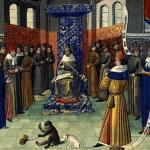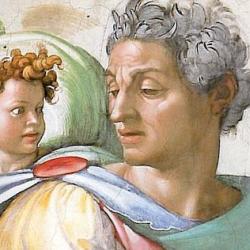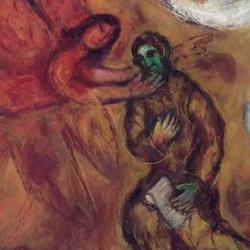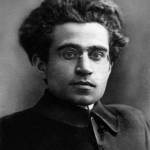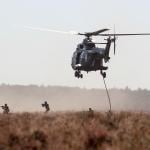Four times in Isaiah 9-10, the Lord repeats that same threat: “In spite of all this His anger does not turn away, and His hand is still stretched out.” And then again, “In spite of all this, His anger does not turn away, and His hand is still stretched out.” And then again, and then again (9:12, 17, 21; 10:4). He has tried everything to bring Israel back. He has brought afflictions, and then new afflictions, and still Israel and Judah do not turn.
He sends out a word, a word of judgment, and the judgment falls on Jacob. The word of Yahweh that falls on Samaria causes things to fall down, specifically things that are made of bricks and sycamore. The men of Babel used bricks to construct their city and tower, and the Egyptians used bricks to build their storage cities and pyramids, and put the Hebrews to work making bricks for these projects.
Now, the people of Samaria have become like the men of Babel and like the Egyptians, building in rebellion against Yahweh. The only other time Isaiah refers to bricks, he is talking about brick altars (65:11), and so it’s possible that this is what he has in view here. The word of the Lord falls on Samaria, and when the word falls, the brick altars and the wooden shrines of the northern kingdom collapse.
But that does not stop the rebellion of the North. Instead, they remain proud and determined to have their idolatrous shrines and altars. If Yahweh knocks them down, then the proud people of Samaria are going to build up their altars again, but this time with cut and polished stone, build them better than they had been, stronger and with more precious materials. If the Lord knocks down their shrines, they are going to rebuild, and this time not with cheap sycamore but with more expensive cedar.
Yahweh is going to raise up adversaries and enemies against the people of the North, as He did against Solomon when Solomon built idolatrous shrines for his many wives. The Lord is going to add to the afflictions of Samaria by opening the jaws of the Philistines and the Arameans. The two nations on the east and west are going to form a large set of jaws, a gaping maw that is going to swallow down Samaria.
Still, Samaria does not turn, and therefore, the Lord’s hand, the hand that brought afflictions and plagues to Egypt, is still stretched out against them.
So the Lord tries a different tack. He pictures the kingdom of Israel as an animal’s body, and He is going to lop off the head and the tail. He pictures Israel as a set of plants, from the high tree to the low bulrush, and He is going to pluck off the top of the tree and cut down the bulrushes.
According to verse 15, the head and palm branch is the elder and the honorable man, the men who are truly lifted up. The tail and the bulrush, the lowest of the leaders of Israel, is the false prophet. Both groups, and all the groups in between are misleading the people. Instead of leading them into abundant life, they are leading them into confusion.
Verse 17 describes the Lord carrying out holy war against the people of Israel. They have become like the Canaanites in the land. They are full of foolishness and they are all godless and evildoers. So the Lord will have no pity. He won’t spare the young men, and He won’t have any pity on orphans and widows. He is going to carry out a war of utter destruction against the people of Israel.
Still they don’t repent, and so His anger does not turn, and His hand is still stretched out.
So the Lord tries yet another tack. Yahweh’s anger burns, His “nose” burns. That’s what causes Israel’s destruction. The land is burned up by the fury of the Lord’s anger, and the people themselves are fuel, they are food for the fire. The fire that burns Israel comes from Yahweh, but there is another fire at work here, the fire of wickedness, a fire that consumes briars and thorns, and sets the forest aflame.
The implication is that Yahweh’s anger burns up the land precisely by enflaming the wickedness of the people. Yahweh wants to clear the land of thorns and thistles, and He wants to burn up the forest. But He does it by giving the people over to their wickedness. It’s a Romans 1 judgment. The Lord burns Israel in judgment, in fury and wrath, by giving them over to the fire of their own wickedness.
Yahweh unleashes the wickedness of social strife. It is a war of all against all, each man devouring his own neighbor. So Yahweh is going to give them over to their cannibalism. It is a grim description of a horrific siege. He will give them over to famine, so that they won’t have enough to satisfy them. And they will become so ravenous that they won’t simply start eating each other, but each will eat the flesh from his own arm.
And even now, after all this, Israel does not turn, and the Lord’s hand is still stretched out.
Israel was supposed to be a sabbatical people. They were to keep Sabbath, that was one of the marks of Israel’s distinctive life. But for Israel Sabbath-keeping was not merely resting on the seventh day. Sabbath-keeping characterized Israel’s entire life, and it meant canceling debts, freeing slaves, celebrating the festivals and inviting the Levites and the strangers to join. It meant giving justice to the widow and the orphan, and not showing deference to the rich and powerful.
Judah and Israel have not kept Sabbath, and they have not enacted justice, and this Sabbatical woe warns that they will come under God’s judgment because their judges pass unjust decisions, deprive the needy of justice, rob the poor of their rights. Instead of protecting the weak, they prey on the weak, making war on them and plundering them.
Even after all this, even after Yahweh has toppled their altars, and cut off head and tail, and stoked up a fire, even after all this, they don’t turn, and so the Lord doesn’t turn either, the Lord doesn’t back off. His hand is still stretched out.
How is Israel ever to escape this cycle? The sequence of judgments gives us a clue. The sequence in chapter 9 is a sacrificial sequence. The Lord throws down altars and shrines. Then the Lord cuts Israel and Judah in pieces. Then He stokes up a fire, and then He gives them to self-cannibalism. Israel is being sacrificed: Dismembered, burned, eaten. Yahweh’s response to Israel’s injustice is to sacrifice Israel.
And that remains His intention and purpose and work. The Lord deals with Israel’s injustice by placing a king on David’s throne (9:1-7), but that Davidic king becomes Israel, and suffers Israel’s fate, not only along with Israel but for Israel. Yahweh’s justice triumphs over Israel’s injustice when the child is cut, when he is placed on the altar of the world, when He is given over to be food, when He becomes sacrificial Israel to deliver sacrificed Israel.

